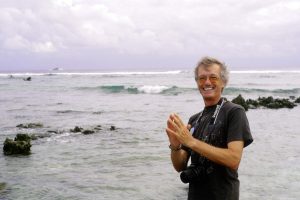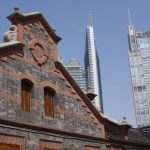 Recently we had the opportunity to sit down with Tony Wheeler, the founder of Lonely Planet, in San Francisco. He was on a whirlwind tour in the United States promoting his new book, Bad Lands: A Tourist on the Axis of Evil. We spent about an hour in the interview.
Recently we had the opportunity to sit down with Tony Wheeler, the founder of Lonely Planet, in San Francisco. He was on a whirlwind tour in the United States promoting his new book, Bad Lands: A Tourist on the Axis of Evil. We spent about an hour in the interview.
Immediately following his book promotion tour he was off to attempt a climb of Mt. Kilimanjaro in Africa 5,895 meters (19,340 feet).
We asked him a series of questions – this is the interview.
Q. How did you decide on the Lonely Planet name?
We had done the first book and were just about to get it printed and did not yet have a name for the business. We had just seen a movie (concert film) called Mad Dogs and Englishmen. It was about a rock’n’roll band on the road in the late 60’s -you can still find the cd in shops. In this film with Joe Cocker and Leon Russell there is a song by Joe Cocker called Space Captain. There is a line that says “Lonely Planet caught my eye”.
Oh that sounds nice, but the only trouble was they didn’t say Lonely Planet at all – they sang “Lovely Planet caught my eye” so we altered it!
Q. Did you know early on that you wanted to be a travel author?
Two inspirations. One is I’ve always loved travel. I loved it when I was a kid traveling with my parents. I’ve always been fascinated with maps and countries. My father was working in a lot of different countries. I lived in the states for a number of years, and the Bahamas. I reckon kids who travel a lot are those with parents who are in the army, work for embassies or work for an oil company. When I was old enough to travel by myself I was always exploring.
The other thing is when I was at the University the thing I enjoyed most of all my undergraduate years was working with the University newspaper. I reckon that a lot of people get into journalism and writing from University newspapers. They are a great grounding experience and I really enjoyed that; I enjoyed putting the publications together. Looking back now I think its obvious; I would get into something that combines the things that I enjoy.
Q. When you were thinking of writing your original guidebook how did you overcome the risk aspect of starting a new business?
Again this something we talked about quite a lot. We had a number of years when it was a real hand to mouth existence. The business was very small. You always look back and think you could have done that differently. If you know what was going to happen you can just go to the horse racing track and put your money on the winner. We could have done things faster in retrospect. If we had gone to the bank and told them this would be a big business one day – they would have said your crazy! The very first year we (Maureen & I) both had full time jobs and then we went traveling for year so we didn’t have any huge business expenses. Then finally two years after our first book we finally started working full time (at Lonely Planet). The first 4 or 5 years was hand to mouth existence but we were enjoying it. It was fun to do. The fact that we didn’t make any money at it, didn’t really matter. I think a lot of people go into businesses for themselves not just to make money but rather because it is something they really believe in; something they have a passion for. There is a lot to be said for this. I remember my father once saying to me, your in your late 20’s now, you have two University degrees, when are you going to get a real job?
Q. Was there a point when you did something that allowed Lonely Planet to really start growing – to take off?
There was. We did our first book in 73′ and it was a real business by 75′. By the late 70’s it was working – we had a few employees, we had a little office and we could pay the rent. It was a small business. And then we came out with our India guide in 1981. It was nearly twice the size of anything we had done before; it sold at 2 or 3x a higher price and it sold far better than anything we had ever done before. So just on the basis of that one book we doubled or tripled the size of the company in one year. We had a little more money at that point so we sent out a team to other countries (China) and we were able to produce thicker books.
Q. What do you enjoy most about being a travel author -other than the travel?!
I’ve always enjoyed travel. I was thinking about this just coming down the elevator now. Part of what we try and do is to give people information and a lot of it is purely factual stuff, this is a good restaurant, that’s a good hotel, but you are also trying to explain things. This book Bad Lands I’ve just done – there is a lot of history in that, some of it is incomprehensible like what has happened in Afghanistan all those years; it is very complicated…and you try to put it down in a fashion that people can read and enjoy and understand. I enjoy putting things together like this.
Q. Which travel authors do you admire?
There’s a heap of travel writers who I have really admired. Rory Stewart’s writing I think is very good – refer to his Places in Between. There’s another book on Afghanistan by Jason Elliot called An Unexpected Light. It came out a couple of years before and that was a brilliant book. He got into Afghanistan – it was a suicidal thing to do and its amazing he didn’t get killed. He then came back to Afghanistan again when the Taliban came in – the late 90’s. He was with the northern Alliance as they were sort of withdrawing. Its a fabulous book and you can feel his passion for the country. It was published 6 months before 9/11 and when 9/11 happened, this was the book to read. You realize why people have this passion for Afghanistan.
Q. What does it take to be successful in this type of work?
Part of what I enjoy is writing the books. I really enjoy the guidebook writing part of it. I don’t do as much of that anymore as I don’t want to keep going back and back (to places). The first time you update a book – you get the thing finished and done and your never happy with it. And you always think, I could have done that better. When your updating a book its almost like you get a second chance and its always easier the second time around as you know your way around; there is less of a strain on yourself. For guidebooks there is this sort of detailed driven thing – there is a lot of fact checking and its always intrigued me how… you get writers who seem like they are the perfect person for it, you’ve seen a lot of stuff they’ve written elsewhere and then they can’t pull it off. They are used to writing magazine articles – a week researching, come back and writing it up and in two weeks the jobs done. Whereas a book you know, 3-4 months on the road – its a whole different demand.
Q. What would you tell the next generation as they explore how to pursue meaningful work?
I think refer to what we were saying earlier – do something you believe in. Your never bored if you’ve got a passion for what your doing. I have to say I did once meet Bill Gates. I spent 45 minutes with him and you know, I don’t think he set out to become the richest man in the world. He liked computers and I think a lot of the computer stuff that has gone on has been from people who just have that passion…that old line about success is one percent inspiration and 99 percent perspiration. You know you can rethink that, and its true. You’ve got to work really hard at it but you’ve got to have that 1% inspiration as well. You can work as hard as you like but if you haven’t got that little bit of inspiration than your hard work isn’t going to get you anywhere.
Q. How do you see your work as making a positive impact on the many pressing needs in the world?
I think that tourism in many countries – is the only industry. If I wanted to defend tourism I look at a place like Nepal – its a country I love and I’ve been back many times. Its fabulous, you get out in the mountains and there is always a reason to go back. What other business is there – there’s a bit of carpet making, there’s subsistence farming and that’s it. If the family land has gone out and you haven’t got a job you go down to work in India… and India is not a place to be an immigrant worker. Its hard enough to be an immigrant worker in the States, let alone India. Tourism is what works there; its a positive force. I’ve done quite a lot of trekking in Nepal and I’ve done some staying in the guest houses along the way but most of it is just trekking (camping outdoors). I’ve got a guy who writes our trekking book and anytime I want to go trekking I just call up him and he will organize it. Its that thing where you’ve got Sherpa’s and guides and people who carry all the equipment. You realize those people know they are doing a good job and they are getting a kick out of it and even though the porters are paid low, its still more than they would be making if they were doing anything else…and that’s a positive thing.
Q. Do you have any charities you support?
We’ve got a Lonely Planet Foundation. We started doing it in the mid 80’s; it was really the Ethiopian famine that kicked it off. We’ve been running it ever since. Today we are putting 5% of our before tax profits into it. We’ve got a woman who runs it. We focus on the developing world – places where we have some sort of contact where we can manage (the money and causes). We also give money to organizations in general often for specific things. We’ve got a number of people we work with. I think we will start doing more of the things ourselves (charity work).
Q. You briefly touched on Bad Lands – tell us more about what that involves.
It is being translated into other languages and I called it Bad Lands after the Bad Lands of the Dakotas and Nebraska in the States. I could have called it “Evil Countries” or “Naughty Nations”. I think the title works quite well but it doesn’t translate very well and one of the things that really amuses me about that is the translators have to come up with their own versions. One country has a great one – it is a word that doesn’t apply to nation’s or countries and its a cross between evil and badly behaving or naughty and just this morning I got an email saying there is going to be a Dutch translation and the Dutch are going to call it “countries where scoundrels govern”. I really like that! As soon as George Bush mentioned his Axis of Evil, well there you’ve got three countries that have to be in it (the book). The other factor is really two countries – one was Burma (Myanmar) and the other was Cuba. We had been doing a Burma book and people criticized us for that. I went back to Burma more often – did they (Burmese citizens) feel people really shouldn’t come to Burma? Then I began to think, just how bad is Burma? Is it the worst country in the world? And then I began to think about Cuba. Cuba is a country where American Presidents think its awful and some people in Miami do but Europeans love the place. Fidel it seems to me is a real mixed bag, on one hand you speak out against Fidel and that’s the end of you like dissidents in Cuba, on the other hand low income mortality, high literacy rate – there is so much stuff about Cuba which Fidel has done very well; its a serious combination.
In the book there is Iran, Iraq, and North Korea which kicked off the Axis of Evil – Burma & Cuba, Saudi Arabia because of the 9/11 hijackers and other things, Libya because of Qaddafi, Afghanistan, and then I threw Albania in (looking back to how the country was during the dictator Enver Hoxha’s time) – I went to Albania around the same time as I was researching the other countries for Bad Lands. Tirane (Albania’s capital city) is a bit of a party town – its really amazing to see the area where Enver Hoxha had his house – the house is still there. At the time he lived there it was completely blocked off. As an Albanian citizen you were not allowed down those streets. And now that area has become the entertainment district – its full of bars and cafes. Today, Hoxer could have walked out his front door and right across the way seen a Buda Bar!
“Tony Wheeler’s Bad Lands: A Tourist on the Axis of Evil (Lonely Planet, April 2007) is Wheeler’s first-hand account of his experience traveling through some of the most repressive and dangerous regimes in the world.”
“In his new book, this Australian travel pioneer provides a fascinating account of life in these closed-off countries that will appeal to anyone with an interest in the state of the world today. Taking into account each country’s attitude to human rights, terrorism and foreign policy, he asks ‘What makes a country truly evil?’ and ‘How bad is really bad?’ – all the while engaging with a colorful cast of locals and hapless tour guides, ruminating on history and debunking popular myths.”
~ Lonely Planet Press Release
Q. Do you have any cute travel stories from your time on the road?
Oh I’ve got loads. One of the funniest ones was doing the book Bad Lands. I was in northern Kurdistan in Iraq in Arbil (Arbil is the capital city of Kurdistan) just wandering around the old town area. I came across this textile museum. It was carpets, travel weavings, camel covers, baby carriers and other things; it was a really nicely put together museum. It was in an old Kurdish house which the guy managed to restore and it was nicely done. But I was thinking this is meant for tourists and Iraq is not a place where there is much of a tourist market at the moment….so I was really astonished by this. Anyway I had a look around and there was a guestbook there… so I had a look at the guestbook to see who had been there. It was either aid workers or people from the embassies in Baghdad. So I kind of looked through and saw the Dutch embassy people had been up a few days before. So I signed my name on it and underneath I wrote Lonely Planet. And about 2 minutes later the guy who runs the place comes leaping over and grabbed my arm and said “Lonely Planet, Lonely Planet – your from Lonely Planet – we’ve been waiting for someone from Lonely Planet to come”! And I thought, God if your in Iraq waiting for the guidebook writers to turn up your going to have a real wait.
And that wraps up the interview. We want to thank Tony and his Public Relations coordinator Cindy for their time.
Additional Links
Lonely Planet: www.lonelyplanet.com
Tony’s Blog: http://tonywheeler.com.au
Thorn Tree Forums: http://thorntree.lonelyplanet.com
Planet Wheeler Foundation: www.planetwheeler.org







Leave a Reply